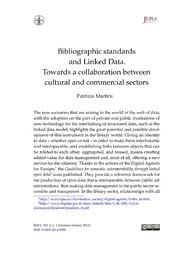Table Of ContentBibliographic standards
and Linked Data.
Towards a collaboration between
cultural and commercial sectors
PatriziaMartini
Thenewscenariosthatarearisingintheworldofthewebofdata,
withtheadoptiononthepartofprivateandpublicinstitutionsof
newtechnologyfortheinterlinkingofstructureddata,suchasthe
linkeddatamodel,highlightsthegreatpotentialandpossibledevel-
opmentofthisinstrumentinthelibraryworld. Givinganidentity
todata–whetheropenornot–inordertomaketheminterlinkable
andinteroperable,andestablishinglinksbetweenobjectsthatcan
be related to each other, aggregated, and reused, means creating
addedvaluefordatamanagementand,mostofall,offeringanew
serviceforthecitizenry. ThankstotheactionsoftheDigitalAgenda
forEurope,1theGuidelinesforsemanticinteroperabilitythroughlinked
opendata2werepublished. Theyprovideareferenceframeworkfor
theproductionofopendatathatisinteroperablebetweenpublicad-
ministrations,thusmakingdatamanagementinthepublicsectorac-
cessibleandtransparent. Inthelibrarysector,relationshipswithall
1http://ec.europa.eu/information_society/digital-agenda/index_en.htm.
2http://www.digitpa.gov.it/sites/default/files/CdC-SPC-GdL6-
InteroperabilitaSemOpenData_0.pdf
JLIS.it.Vol.4,n.1(Gennaio/January2013).
DOI:10.4403/jlis.it-8598
P.Martini,BibliographicstandardsandLinkedData...
informationmanagementactorsneedtobeanalyzedandredefined.
In particular, collaboration and dialogue between all subjects in-
volvedintheinformationchainofproductionneedstobepromoted,
inordertoanalysedifferentstandardsandspurthedevelopmentof
innovativeinitiativesintheculturalfieldthatcanbecomeakeyfac-
torforeconomicandsocialgrowth.Amongtheactivitiesinvolvedin
thisprocess,acentralroleisplayedbythoserelatedtothestandards
usedinthelibrarysectorandothercommercialsectors,andtheir
integration. Theadoptiononthepartoflibrariesofdatamodelsthat
aremorestructuredandgranularcomparedtotraditionalcatalogue
formats, would help enrich the metadata traditionally used. On
theotherhand,acomparisonofcommercialstandardswithwell-
established, traditional library, museum, and archival standards
wouldensurethequality, authoritativeness, andsustainabilityof
data. Inkeepingwithitsinstitutionalmission,IstitutoCentraleper
il Catalogo Unico delle Biblioteche Italiane e per le Informazioni
Bibliografiche(ICCU)hasalwaysbeenresponsibleforelaborating
nationalrulesforthedocumentationofalltypesofmaterials,andfor
thedefinitionanddiffusionofinternationalstandards,withthegoal
of achieving interoperability among the various cultural sectors.
At the national level, through Committees and Working Groups
staffedbyexperts,includingsomeworkinginotherinstitutionsof
theMinistryofCulturalHeritageandActivities,ithasdisseminated
internationalstandardsanddraftedguidelinesforthedocumenta-
tionofculturalheritage. ThroughthenewRegoleitalianedicata-
logazione(REICAT)cataloguingcode,whichisderivedfromthe
FunctionalRequirementsforBibliographicRecords(FRBR)model,
adatamodelwasobtainedthatrepresentsbibliographicitemsin
a more granular way. In the National Library Service (Servizio
BibliotecarioNazionale-SBN),theIndexdatabasehasthebiblio-
graphicrecordsstructureasasystemof”entities-relationships”,and
JLIS.it. Vol.4,n.1(Gennaio/January2013).Art.#8598 p.306
JLIS.it.Vol.4,n.1(Gennaio/January2013)
theapplicationofstandardsandcataloguingrulesrefertowithin
ServizioBibliotecarioNazionale(SBN)hasreflectedthisstructure.
Thanks to the new SBN Machine Readable Cataloguing (MARC)
format,therepresentationof”entities-relationships”ismorecom-
plexandflexible;indeed,itispossibletorecorddataonalltypesof
materialaccordingtovariouscataloguingandnetworkparticipa-
tionlevels. Onthedigitalizationfront,theInstitutecoordinatesthe
harmonizationofnationaldigitizationpoliciesandthedevelopment
ofstandardsformetadataandguidelinesforapplication. Thenew
researchandworkinggrouponmetadata,whichseestheparticipa-
tionofmuseumsandarchives,haslaunchedthefollowingfieldsof
activitybasedonlinkeddata:
• recoveringSBN’s”semantics”throughthemappingofSBN-
MARCandResourceDescription&Access(RDA)elements
presentintheOpenMetadataRegistry;3
• analysisofthestateoftheapplicationofpersistentidentifiers
inthelinkeddatafield;
• researchontheSchema.org4initiativeforthecodificationof
theResourceDescriptionFramework(RDF)querylanguage
in HTML pages; this codification allows search engines to
”understand” the structure and typology of the documents
beingindexed;
• strengthening collaborative efforts with the Virtual Interna-
tionalAuthorityFile(VIAF),byaugmentingthesendingof
authorityrecordsofSBNauthorsarchive;
• theanalysisofacrowdsourcingmodelthatusesthecontribu-
tions of the users of bibliographic services, with the aim of
3http://metadataregistry.org.
4http://schema.org.
JLIS.it. Vol.4,n.1(Gennaio/January2013).Art.#8598 p.307
P.Martini,BibliographicstandardsandLinkedData...
enrichingthemetadatatraditionallyproducedbyprofessional
communities;
• attheinternationallevel,ICCUcoordinatesandparticipatesin
Europeanprojectsforthemanagementandaccessibilityofdig-
italcontent,includingMINERVA,MICHAEL,ATHENA,DC-
NET,Europeana,INDICATE,LinkedHeritage,WDL,Partage.
Withintheseprojects,standardsplayakeyrole,withtheelab-
oration of best practices for the definition of heterogeneous data
sets. Within the framework of the Europeana platform,5 starting
onJuly2012,themetadatarelatedtodigitalobjectsconcerningthe
Europeanculturalheritagewillbepresentedaccordingtothelinked
opendatamodel,withacreativecommonslicense,assetoutunder
theDataExchangeAgreementunderwrittenbytheEuropeanpart-
ners. Collaborationswiththepublicandprivatesectorsincludea
workwiththecommunityofeditorstodevelopanewvocabulary
forsupport,media,andformattypes,whichledtothecreationof
theRDA/ONIXFrameworkforResourceCategorizationwhichhas
mergedintothelibrarycommunity,particularlywithinIFLA’sCom-
mittees. Thisworkconstitutesthebroadestgroupingframework
forthecategorizationofresourcesofvaryingcontentsandavailable
onallsupporttypesusedbythevariouscommunities. Established
with the goal of supporting the needs of libraries and publishers
andtofacilitatedatatransferanddialoguebetweenthecommuni-
ties,thisefforthasproducedavocabularyofcategoriesuponwhich
thevocabulariesofInternationalStandardBibliographicDescrip-
tion(ISBD). ConsolidatededitionandthenewRDAarebased. The
controlledvocabulariesandtheRDAelementsareavailableinthe
OpenMetadataRegistryaslinkeddatainRDF. Thenewdescriptive
elementsfortheISBDArea0”Contentformandsupporttype”are
5http://www.europeana.eu/portal.
JLIS.it. Vol.4,n.1(Gennaio/January2013).Art.#8598 p.308
JLIS.it.Vol.4,n.1(Gennaio/January2013)
alsopublishedinItalianintheOpenMetadataRegistry.ICCUiscur-
rentlystudyingwaystoimplementtheseelementsintheSBNIndex
andtheLibraryManagementSystem. Anothersuccessfulpublic-
privatepartnershipwasestablishedthroughtheEuropeanARROW
Plusproject,coordinatedbytheItalianPublishers’Association(As-
sociazioneItalianaEditori-AIE),whichhasdevelopedadistributed
system for managing information on authors’ rights. ICCU, one
of the project’s partners, is the ”National Contact Point” for Ital-
ianlibraries. TheprimarygoaloftheLinkedHeritage6 European
projectistofosteranincreaseincontributiontoEuropeanaportal
from both the public and private sectors. In particular, activities
carriedoutaspartofWP4”PublicandPrivatepartnership”focused
onanalyzingandcomparingthemetadatausedinthetwosectors,
intermsofdefiningandsharingmetadatamodels,integratingdata
fromthecommercialsector(books,music,filmandTV,photogra-
phy),developingstandardsandbestpractices,datamappingand
aggregation,licensesandbusinesscases. Theissueofintegrating
standardsfromvariouscommunitiesandtheadoptionofmodels
torepresentcomplexdataisalsotackledintherecommendations
setoutinthefinalreportoftheworkinggroupsestablishedbythe
WorldWideWebConsortium(W3C)forthefeasibilitystudyforthe
LibraryLinkedDataIncubatorGroup. Finalreport,7 publishedin
October2011. Thefindingsofthisworkinggrouplaunchedaseries
ofactivitieswhoseultimatepurposeistheadoptionofthelinked
dataparadigmasanindispensabletooltowardsanopen,interop-
erablesemanticweb. Integrationwithdataproducedbylibraries
withotherwebresourceshighlightstheirnewrolewithregardsto
thebroaderonlineinformationcommunity. Coordinationwithnon-
institutionalactorsinvolvedwithproduction,dissemination,and
6http://www.linkedheritage.eu.
7http://www.w3.org/2005/Incubator/lld/XGR-lld-20111025.
JLIS.it. Vol.4,n.1(Gennaio/January2013).Art.#8598 p.309
P.Martini,BibliographicstandardsandLinkedData...
accesstoinformation,meanscreatingaddedvaluetoinformation
andprovidinguserswithahighqualityservice,butalsoadopting
anewattitudetowardstheinstitutionalworld’stasksconcerning
thefieldofbibliographiccontrolandthepromotionanddiffusionof
culture.
JLIS.it. Vol.4,n.1(Gennaio/January2013).Art.#8598 p.310
JLIS.it.Vol.4,n.1(Gennaio/January2013)
PATRIZIAMARTINI,ICCU.DepartmentforInternationalprojectsof
culturalheritage.
[email protected]
Martini,P.”BibliographicstandardsandLinkedData.Towardsacollaborationbe-
tweenculturalandcommercialsectors”.JLIS.it.Vol.4,n.1(Gennaio/January2013):
Art:#8598.DOI:10.4403/jlis.it-8598.Web.
ABSTRACT: TheCentralInstitutefortheUnionCatalogueofItalianLibrariesand
BibliographicInformation(ICCU)istheNationalBibliographicAgencyforthecoor-
dinationanddisseminationofinternationalstandardsandcataloguingruleswithin
Italianlibraries.LinkedHeritage,theEuropeanprojectcoordinatedbyICCU,will
contributelargequantitiesofnewcontenttoEuropeana,fromboththepublicand
privatesectors.TheWorkPackage4Publicprivatepartnershipisworkingtoproduce
aninnovativeinvestigationthathighlightsthedifferencesbetweenmetadatacreation
intheculturalsector(libraries,museumsandarchives),comparedwiththemetadata
ofcommercialsector.TheworkwhichtheGroupiscarryingout,willpointoutthe
differentrolesandpurposesbetweenthepublicandprivatesectors:howcommer-
cialmetadatacanenrichthedatawithmoreinformationgivingpotentialbenefits
andnewservicestoEuropeanausers,whilelibrariesmodelsandstandardsprovide
stability,harmonizationandanhigherlevelofgranularityofthedatainorderto
facilitatethefunctionsofresourcediscovery. WP4Publicprivatepartnershipwill
offeranopportunityofproducingseveralmetadatamappings.Thispaperanalyzes
theenrichedinformationthatcanbeofferedbeyondthetraditionalbibliographic
description.
KEYWORDS:Librarylinkeddata;LinkedHeritageProject;Europeana
Submitted:2012-06-15
Accepted:2012-08-31
Published:2013-01-15
JLIS.it. Vol.4,n.1(Gennaio/January2013).Art.#8598 p.311

